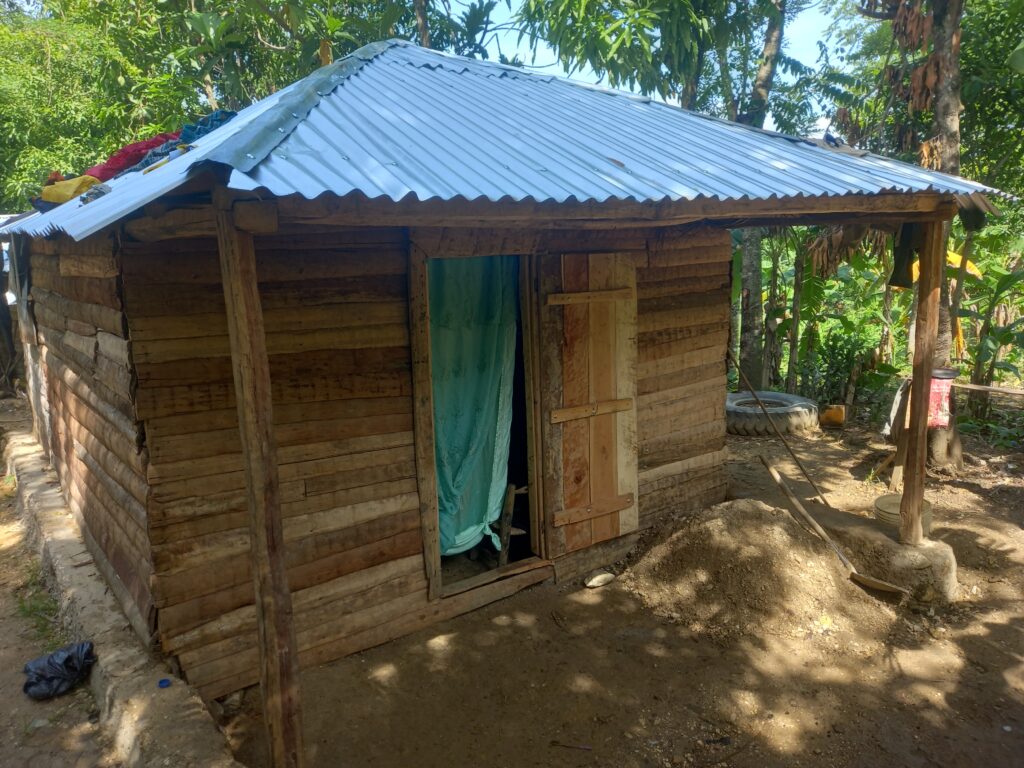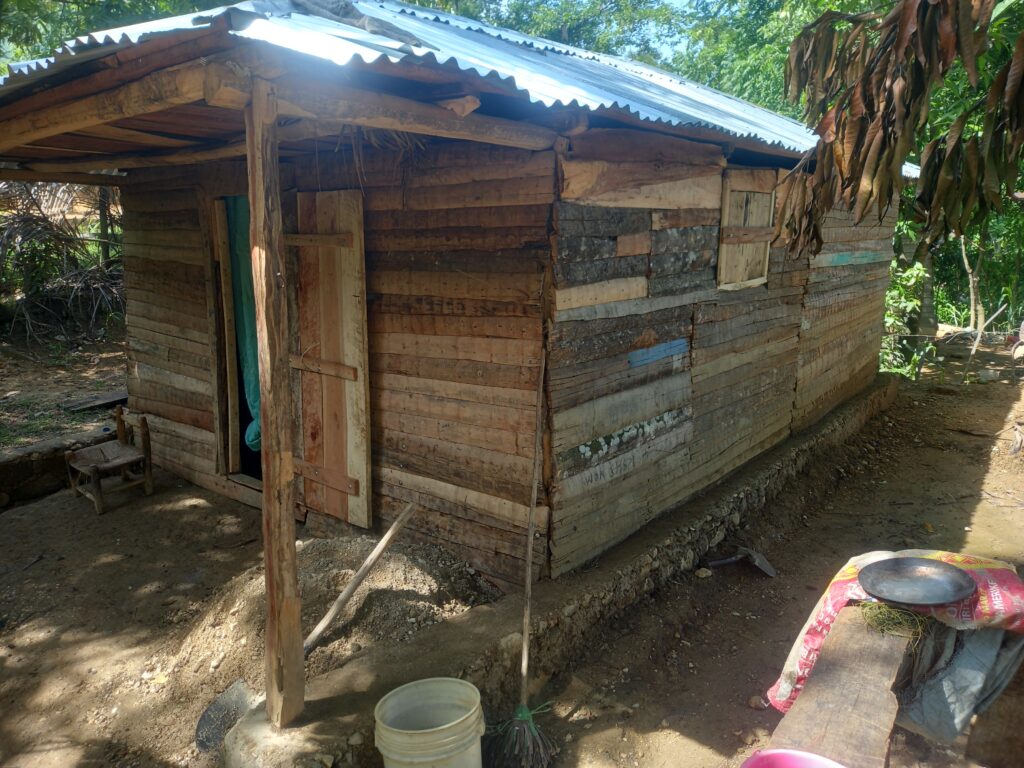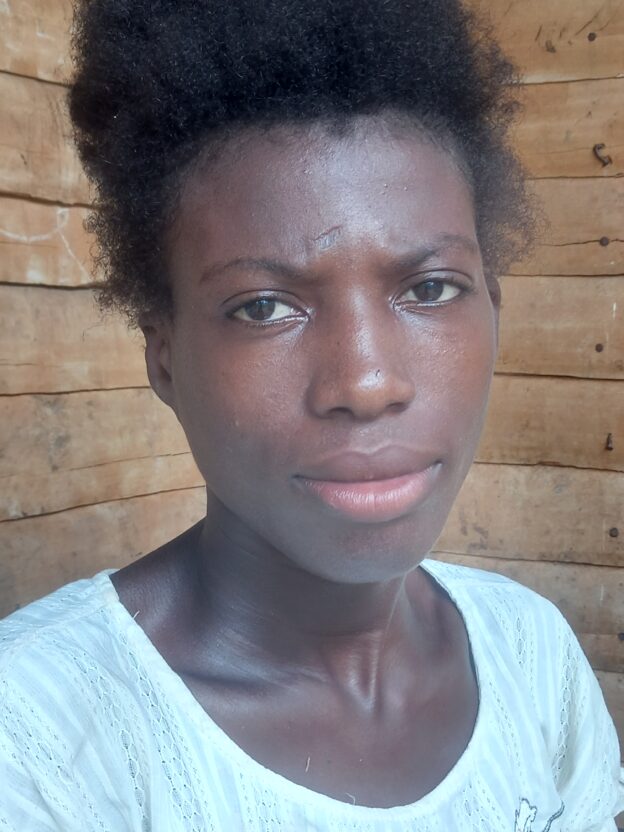Rosemicia lives with her partner and her little boy in a small house off the road that passes through Pouli, in eastern Laskawobas. Her partner farms, but her main source of income is her small business. She’s a candy-maker. She cooks down local sugar and mixes it with peanuts or coconut. She sells it in two forms, either cut into chunks like fudge or in small, harder disks called “tablèt.”
She buys her ingredients at the Laskawobas market, and she walks there almost every day. On the way to the market, she calls out her wares, selling as she goes. She then sells whatever remains by strolling around downtown Laskawobas. Once she’s sold out, she buys ingredients for the next batch and walks back home.
She had this business even before she joined the CLM program. It enabled her to keep herself afloat, but she could not do more. She and her boy’s father had started work on a house they lived in, but they couldn’t make any progress because they could never earn enough. That man has since left her.
She started to move forward using the weekly stipend that she received for her first six months in the program. She used as much as possible to make sure she’d be able to buy shares in her savings and loan association every week. Making those weekly contributions made her eligible for a loan, and she borrowed 10,000 gourds, almost all of which went to paying off debts she had incurred throughout her neighborhood before she joined the program. She mainly owed money for food, but that wasn’t all. “I hadn’t paid for the sheets I needed when I moved into my home.” Once all her debt was in just one place, she was able to start eliminating it methodically, and just one repayment remains.
As she looks ahead, she has a single clear vision. She doesn’t really want to grow her business. “I don’t want a big commerce. There isn’t really anything that sells.” Her candy business works, so she plans to continue it, especially since her family is still small.
But she has goats that the program gave her, which are slowly increasing in value. She received two, and one died but the other one had a healthy kid. She bought two more with money that was left over because she was completing a house she had already started so she required less material than the program budgeted for her. One of those goats died as well, but she now has three healthy goats. She also has savings accumulating in her savings and loan association that she will receive as a pay-out this summer.
She has a plan for her pay-out. She will take it from the association and deposit it into a local savings institution. That savings deposit will serve her as collateral for a loan. She plans to use the loan to buy her own land. She is happy that CLM helped her finish the house she’s in, “but I would like my own house, made of blocks, not palm-wood, on my own plot of land.”
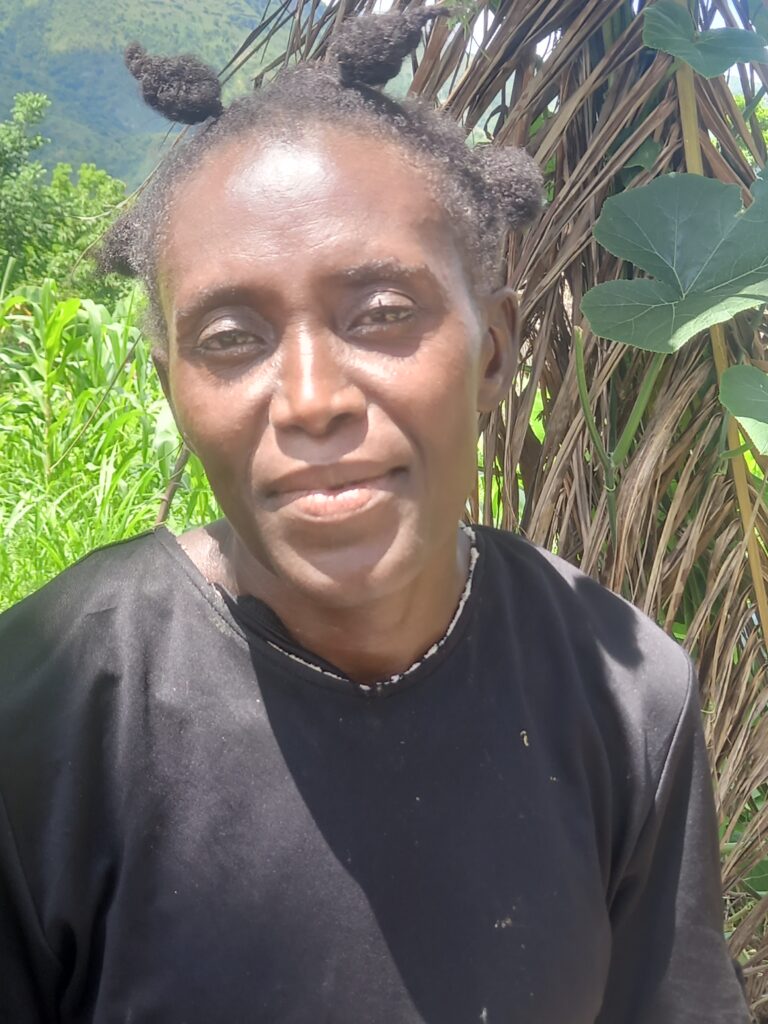
Roseline lives close to Rosemicia, but she hasn’t lived there long. She was initially staying on land belonging to one of the area’s larger landowners. He had given her permission to live in a shack on a small corner of it, and had even agreed to let her install her latrine there. He seems to have been full of good will.
But he travels for extended periods, and while he was away other members of his family, who were unhappy with his kindness towards Roseline, decided to make things hard for her. She felt that she couldn’t stay any longer.
She initially moved in with one of her sisters. But she had another sister who had built a small house on a plot of land that she leased for five years. That other sister, like Roseline, had trouble with a neighbor. In her case, a conflict that started when a child was hurt slightly while playing with another child turned into something of a feud. She started working on another house on another piece of land just to get away from the neighbor.
When Roseline and her case manager suggested that Roseline could just buy the house, the sister was delighted at the chance. Roseline thus used money from the funds Fonkoze had available for her home construction to buy the house her sister had already built along with the three years remaining on the lease. Her case manager, Rony, believes that the man whose land she was driven from will be willing to pay for her to install a latrine. His family is, apparently, using the one he let Roseline and CLM install on his land.
Before she was in the program, Roseline had been getting by on small commerce. “I never let one business keep me. I would sell anything.” She would sell groceries or used clothing or produce. But she didn’t have her own money. She depended on her sisters to lend her what they could each day she went out to sell. But she couldn’t sustain the business, much less make it grow. “When you don’t have your own means, you can’t keep your business going. They give you money in the morning, and you have to pay it back at night.”
Roseline asked Fonkoze to give her goats and a pig. Her case manager bought her two goats first, but by the time he did, there was too little money remaining to buy the pig. They bought three chickens instead. Buying a pig remains one of her goals.
Her goats have been flourishing. One had three kids — though one of the three died — and the other had one. The one that had just one is now pregnant again. She wants to take good care of the goats and of whatever other animals she can accumulate because she sees them as her best way to buy land, or at least to make an acceptable downpayment, by the time the lease she took over from her sister has run out.
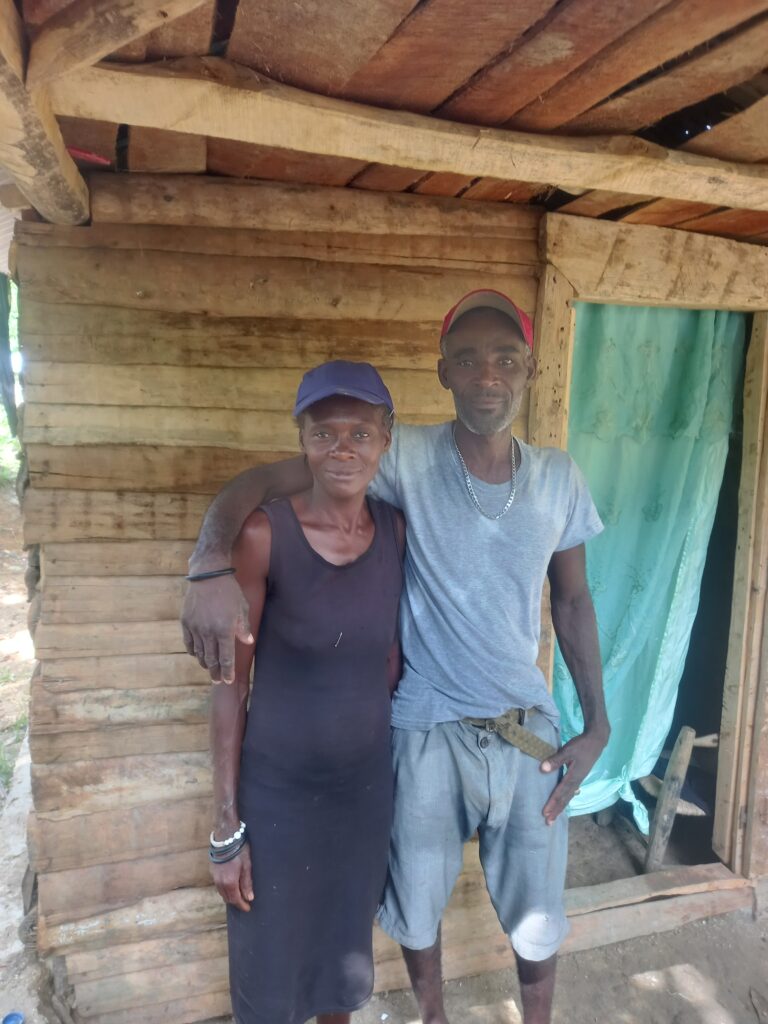
Hercimene lives with her partner, Yonel, and their three children in a house in Wòch Pab, a small community just across the river that runs south of the main route through Pouli. A daughter whom Yonel had with another woman lives with them as well. Hermicene has four older children no longer live at home. Two are adults, and two live with other members of the family.
The family lives by farming, though they themselves have too little to make much of. Instead, both Hermicene and Yonel work as day laborers in neighbors’ fields. “If we each make 250 gourds in a day, we spend 250 and save the other 250.” Hermicene used to be able to make more by taking full-time work as a maid, but CLM has made that impossible. “I have to be available for my visit every week and I have to go to my VSLA. Women won’t hire you if you can only work three days.
The couple’s ability to save money has been especially important since they joined CLM. It enabled them to finish their new home before any other of the members in their neighborhood. It cost them a lot. They bought palm wood planks for 15,000 gourds. The hardwood for windows and doors and to give the roofer something to nail their tin to cost 10,000 more. That is a lot of money to spend while feeding their children and sending them to school.
The couple is taking care of the goats they received, but haven’t had much luck so far. The received three initially, but two died before they were vaccinated. The program has replaced one, and there are plans to replace the other. Hermicene sees the goats as important, because selling one occasionally might be the best way to ensure her kids can stay in school. “You take care of them and take care of their young. If one gives you a billy-goat, you can sell it and buy another female, so they can keep increasing.”
